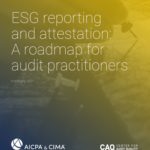
The Committee of Sponsoring Organizations of the Treadway Commission (COSO) today released a groundbreaking study with supplemental guidance for organizations to achieve effective internal control over sustainability reporting (ICSR), using the globally recognized COSO Internal Control-Integrated Framework (ICIF). COSO believes its use will build trust and confidence in ESG/sustainability reporting, public disclosures, and enterprise decision-making.
Leveraging the significant knowledge gained in the application of ICIF to financial reporting over the past two decades, “Achieving Effective Internal Control over Sustainability Reporting (ICSR): Building Trust and Confidence through the COSO Internal Control―Integrated Framework” introduces “internal control over sustainability reporting” (ICSR) into the internal control lexicon. The new study references and expands on a 2017 study by three of the co-authors, “Leveraging the COSO Internal Control—Integrated Framework to Improve Confidence in Sustainability Performance Data,” which helped to spur the journey toward consistent standards and frameworks to achieve sustainability goals.
“More companies are now in various stages of implementing controls and governance processes over the collection, review, and reporting of sustainability information, including creating multifunctional teams that bring together a company’s sustainability, finance and accounting, risk management, legal, and internal audit professionals,” said COSO Chair Lucia Wind. “In many ways, sustainable business reporting is still subject to evolution and innovation. As a result, it will be a process of continuous improvement including building internal capacity and relevant assurance.”
The supplemental guidance points to several key themes as organizations and practitioners begin or continue their journeys toward establishing and maintaining an effective system of internal control over financial and sustainable business information. Although ICSR is not yet well established in practice, the paper discusses crucial insights that can be gained from the experiences of those organizations that are leading the way. In the new study, each of the 17 principles in ICIF-2013 is explained and interpreted for application to sustainability. Additionally, “points of focus” from the ICIF are included along with practical insights and application of the supplemental guidance.
“This new supplemental guidance is significant and extremely timely given upcoming final rules on climate risk from the SEC and ISSB, not to mention the journey organizations are on to build sustainable management principles into their core mission, purpose, governance, and strategies. The guidance is global, and transcends accounting, reporting, and assurance,” said Wind. “Effective internal control is good for business and applies well beyond external financial reporting as COSO’s ICIF points out. All organizations are on a learning and growth journey to enhance and build trust and confidence in sustainable business information for internal and external decision making.”
The principal authors of this guidance are:
- Robert Herz, former FASB chair, founding member of the IASB and former SASB Foundation board member;
- Robert Hirth, Senior Managing Director at Protiviti, former COSO Chair and former vice-chair of the SASB;
- Douglas Hileman, consultant, ESG specialist, and member of [former] ESG Leadership Knowledge Group;
- Shari H. Littan, IMA Director, Corporate Reporting Research and Thought Leadership;
- Brad Monterio, IIA EVP of Member Competency and Learning and member of the IFRS Foundation’s IRCC; and
- Jeffrey C. Thomson, President and CEO of IMA and former COSO board member/lead director.
COSO wishes to thank Chair Emeritus Paul Sobel for his oversight and leadership of this project during his term as Chair.



